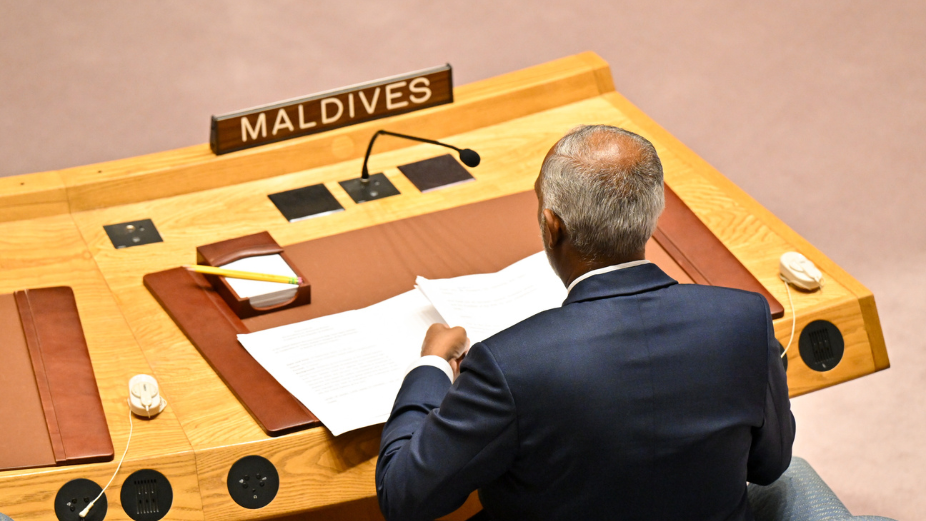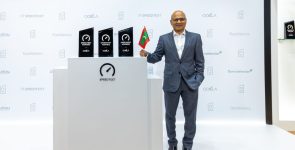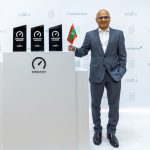
President Dr Mohamed Muizzu delivered a series of speeches on the sidelines of the 79th Session of the United Nations General Assembly (UNGA79) in New York. His addresses centred on critical global issues, including sea-level rise, climate change, and the effectiveness of the United Nations Security Council.
Emphasis on the Threat of Sea-Level Rise
In the High-Level Meeting on Sea-Level Rise, President Muizzu highlighted the existential threat that rising sea levels pose to small island nations like the Maldives. “Eighty per cent of our islands stand less than one metre above the encroaching tides,” he stated. “Nearly half of our population, and almost as many homes, are within a mere 100 metres of the coastline.”
He reminded the international community of the Maldives’ long-standing warnings: “We’ve been sounding the alarm since 1987, yet the problem has only intensified.” Stressing the urgency of decisive action, he posed a poignant question: “If we leave without tangible outcomes today, we must ask ourselves: Why are we even here?”
Calls for Immediate Action and Support
President Muizzu urged for immediate measures to address sea-level rise, focusing on increasing adaptation finance, operationalising the Loss and Damage Fund, and facilitating technology transfer. “Adaptation support has not caught up to the rate of climate degradation. We urge to double adaptation financing. We ask to remove the tedious approval procedures, and conditions to access finance,” he remarked.
Highlighting the financial toll on Small Island Developing States (SIDS), he noted, “In the past five decades, extreme weather events have caused 153 billion US dollars’ worth of loss in SIDS. The pledges to the Loss and Damage Fund… remain woefully inadequate.”
On technology transfer, President Muizzu stated, “We have the science. We have the knowledge. And we have the tools to combat climate change. But these tools rest with advanced economies. We believe… advanced economies have a moral and humanitarian responsibility to facilitate the transfer of technology to SIDS and other developing countries, on favourable terms.”
Critique of the UN Security Council
President Muizzu addressed the United Nations Security Council during a high-level open debate on ‘Leadership for Peace: United in Respect of the UN Charter, in Search of a Secure Future’. He delivered a candid critique of the Council’s inaction in the face of global crises.
“Global mistrust in the multilateral system continues to grow. And that is largely because of the ineffectiveness and inaction of the Council,” he declared. “We sit here today while a genocide unfolds under the nose of a Security Council unwilling to uphold international law and put an end to it.”
Referring to the situation in Gaza, he cited findings from international legal bodies: “In July of this year, the International Court of Justice found that Israel’s occupation of Palestinian territory is illegal, that Israel must evacuate settlements and pay reparations to Palestinians.”
Advocacy for Reform and Representation
President Muizzu called for significant reforms within the Council, including abolishing the veto power. “We must abolish the veto. The veto continues to paralyse the Council from stopping Israel’s genocidal war against the Palestinian people. The veto has allowed Israel to continue with impunity, in practising brutal occupation and risking regional security.”
Advocating for greater representation, he said, “The Security Council must become more representative. Its composition is archaic and outdated. For example, Small Island Developing States are one-fifth of the UN membership. Our voices matter. Our perspectives matter. We deserve a seat at the table.”
He urged an end to ineffective discussions on UN Security Council reform: “Let us also bring an end to ineffective talks on UN Security Council reform, that have not produced a result for more than fifteen years. Let us start fresh. With renewed hope and fresh resolve.”
Preservation of Livelihoods and Cultural Heritage
As co-chair of the UN High-Level Meeting on Sea-Level Rise’s interactive dialogue on ‘Livelihoods, Socio-Economic Challenges, and Culture and Heritage’, President Muizzu stressed the multifaceted impact of rising sea levels.
“Sea-level rise… is a Trojan horse that conceals a myriad of threats to our shorelines, communities, cultures, and survival,” he remarked. Emphasising the determination of his people, he declared, “No Maldivian would, willingly, abandon their homeland, their island. We are determined to protect our islands. And, Insha Allah, we will survive.”
He highlighted the need to diversify economies, protect cultural identity, and reconsider approaches to sea-level rise. “We need international support and stronger action to reduce emissions to reach the 1.5°C goal. It’s not enough to protect our shores. We need to protect the sustainable livelihoods of those whose lives have always depended on the ocean—a resource that has sustained us for several millennia.”
“As we pursue economic resilience, we cannot afford to lose our identity, culture, and heritage. Safeguarding cultural identity requires more than words. It demands robust policies, resources, and resilient infrastructure.”
A Call for Empathy and Decisive Action
Throughout his speeches, President Muizzu emphasised the urgency of immediate and concrete measures over prolonged discussions. Reflecting on decades of advocacy without sufficient progress, he questioned the effectiveness of current efforts: “We brought this issue to the forefront over 30 years ago, and now, with the stakes higher than ever, we find ourselves making the same pleas.”
He concluded his Security Council address with a demand for accountability and reform: “Talk is cheap. We deserve better than empty rhetoric and half-hearted gestures. We demand better.”
President Dr Mohamed Muizzu’s addresses at UNGA79 highlighted the Maldives’ unwavering commitment to tackling critical global challenges. His candid remarks served as a stark reminder of the urgent need for collective action and the revitalisation of international institutions to effectively respond to the pressing issues of our time.












